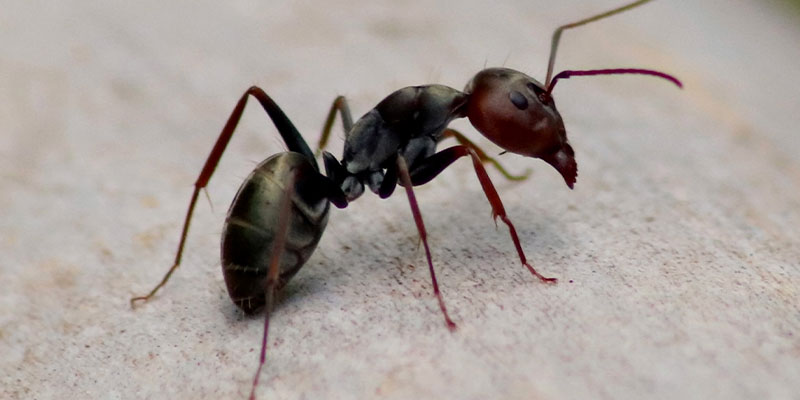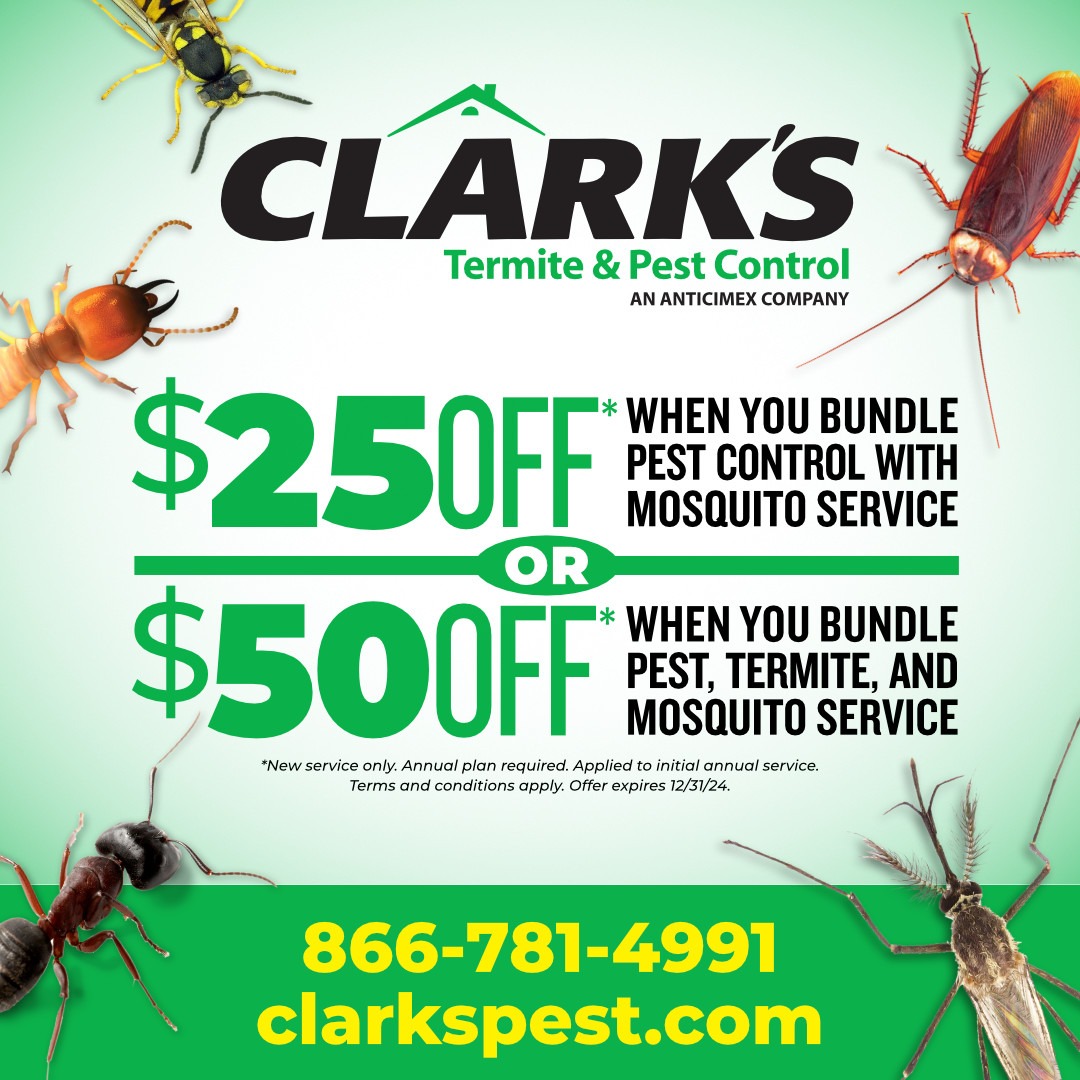If you live in the Carolinas, you’ve probably had a run-in with ants at some point—and if you haven’t, it’s only a matter of time. Ants can be really pesky and hard to get rid of once they take up residence in your home. They’re everywhere.
And if you have small children or pets, it’s even worse. You don’t want your child or dog to eat them, but they seem to find their way into every corner of your home.
Clark’s Pest is here to tell you how to identify an ant problem in your home or business and what to do about it.
Let’s dive in:
What are Ants?

While our main focus will be laying out strategies to keep these tiny disrupters at bay, it’s essential first to understand the nature of ants.
Scientifically referred to as Formicidae, ants might be small, but they hold substantial potential to cause chaos within your home. They are characterized by their long antennae and a distinct body structure that is divided into three regions: head, thorax, and abdomen.
What may come as a surprise is that ants’ roots trace back to around 100 million years ago. From that timeline to your homes in North Carolina or South Carolina, they’ve endured and evolved over the ages to become the annoying intruders we grapple with today.
The Different Types of Ants You See in the Carolinas?
While the world of ants is home to thousands of species, the specific climate and environmental conditions in North and South Carolina have led to the prevalence of certain ant species over others.
Here’s a closer look at some of the ants you might be dealing with:
1. Carpenter Ants
Carpenter ants are relatively large, ranging from 0.3 to 1 inch in length. They are usually black but can also have reddish or yellowish colorations. They prefer to nest in moist wood and could potentially damage structures.
While they don’t pose a direct threat to humans, their ability to damage wood can be a cause for concern.
2. Acrobat Ants
Named after their peculiar habit of raising their abdomen over their head when threatened, Acrobat ants vary in color from light brown to black. They are usually found in wet or damp areas, such as around plumbing.
Though considered a minimal threat to humans, their presence can be a nuisance due to their liking for sweets, proteins, and greasy foods.
3. Little Black Ant
Just as the name suggests, Little black ants are tiny (around 1.5mm in size) and dark brown to black in color. They’re seen in different habitats, including homes or sidewalks, and they’re attracted to sweet food.
While they are not harmful, their sheer numbers (as they tend to live in large colonies) can be a significant nuisance if left unchecked.
4. Pharaoh Ants
Pharaoh ants, light yellow to red in color with a dark abdomen, are tiny – measuring about 1/16 of an inch in length. They typically inhabit warm, humid areas and are often found in kitchens and bathrooms.
Although not dangerous in themselves, Pharaoh ants pose a heightened threat level as they are known to spread several diseases, including salmonella and staphylococcus.
5. Other Species
While the Carolinas are home to the aforementioned ant species, a variety of others also make their appearance here. Some of these are:
Argentine Ant
Pheidole
Yellow Crazy Ant
Harvester Ants
Banded Sugar Ant
Though lesser known, these species can pose as much, if not more, of a threat to your homes in North Carolina and South Carolina. Regardless of the type of ant intruder, ant control is a necessity before a minor issue escalates into a major infestation.
Timely intervention from a reliable ant control expert, like Clark’s Pest Control, can ensure your home remains an ant-free zone.
Why Are Ants a Problem?
People across North and South Carolina often reach out to Clark’s Pest Control for assistance in managing various ant-related issues, including:
They can contaminate household foods, like sugar and fruits, potentially leading to the transmission of diseases.
Species such as carpenter ants pose a threat to wooden structures in homes.
Unsettling presence in personal spaces, such as kitchens, bedrooms, and even beds.
Unsightly ant hills that pile up soil around your home, spoiling residential aesthetics.
Taken together, it’s clear that even the smallest ant infestation in the Carolinas shouldn’t be taken lightly, given its potential health and property implications.
3 Reasons You Keep Having Ants in Your Home
Here are three common factors that make your North or South Carolina home susceptible to ant invasions and what to do to prevent them:
Food availability: Ants love food that is readily available, particularly sweets and oily treats. Be sure to store food in sealed containers, clean up spills immediately, and properly dispose of waste to deter ants.
Moisture and leaks: Ant species, such as pharaoh ants, need access to water for survival. Regularly inspect your home for leaks and address any sources of excessive moisture.
Decaying wood: Damp or decaying wood is an ideal habitat for ants, especially carpenter ants. Ensure you replace any damaged wood in your home and promptly remove compromised wood debris from your yard.
Taking these precautions can help, but if you find yourself dealing with a substantial ant infestation, it’s best to consult with professional pest control services like Clark’s Pest rather than tackle the issue on your own.
When Should I Call a Professional Ant Exterminator?
If an ant infestation becomes overwhelming, the do-it-yourself approach is failing, or the ants are causing damage to your home, it’s time to seek professional help. Skilled ant exterminators are invaluable for tackling persistent, large-scale invasions and ensuring your home remains ant-free.
With Clark’s Pest Control, you’re in safe hands. Our experienced team not only eliminates existing ant problems but also implements preventative measures to safeguard your home against future issues.
Need our services? Don’t hesitate to call or text us at 866-781-4991 – we’re always ready to help.
.
Ant FAQs
Even as an expert ant exterminator, making a house absolutely ant-proof is challenging without the use of harsh products. However, our techniques can significantly minimize their presence and prevent infestations.
You might notice signs like rustling noises within the walls, an unusual amount of winged ants around, or small piles of dust or debris from their excavations. We can provide a definitive answer through professional inspections.
No, not all ants are destructive. Species like carpenter ants can cause structural damage. However, many ants, like sugar ants, are more of a nuisance than a threat.
Ants usually set up shop near food and water sources. It means you’re likely to spot them in or around kitchens, bathrooms, and basements. They can also be found outdoors near decaying wood or vegetation.
GET A FAST FREE ESTIMATE

